

Andreï Roublev (1969) Andreï Tarkovski. Año VII-2010. Stalker. Parte 1 (Subtitulada al castellano). Andréi Tarkovsky. en 35 MM - A GROUP FOR CINEPHILES! Andrei Rublev (1966. Nostalghia (1983. Stalker. Parte 2 (Subtitulada al castellano). Andréi Tarkovsky. en 35 MM - A GROUP FOR CINEPHILES! The Polaroids of Andrei Tarkovsky : The Mystery of Everyday Life. Polaroid by Andrei Tarkovsky from the book Instant Light: Tarkovsky Polaroids from Thames and Hudson.
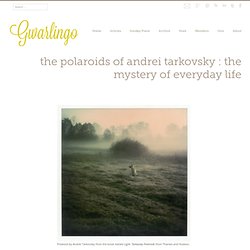
“Never try to convey your idea to the audience,” said Russian filmmaker Andrei Tarkovsky, “—it is a thankless and senseless task. Show them life, and they’ll find within themselves the means to assess and appreciate it.” Tarkovsky is best known for such cinematic masterpieces as Solaris, The Mirror, Andrei Rublev, and Stalker. Tarkovksy’s vision was unique as a filmmaker; he favored long takes and leisurely scenes that explored the beauty and mystery of everyday life.
“We can express our feelings regarding the world around us either by poetic or by descriptive means,” Tarkovsky explained in an 1983 interview with Hervé Guibert in Le Monde. I prefer to express myself metaphorically. Gorgeous Polaroid Photos by ‘Solaris’ Director Andrei Tarkovsky. Andrei Tarkovsky: Interviews. Andrei Tarkovsky (1932-1986) was one of Russia's most influential and renowned filmmakers, despite an output of only seven feature films in twenty years.
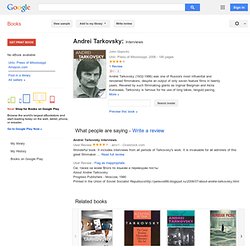
Revered by such filmmaking giants as Ingmar Bergman and Akira Kurosawa, Tarkovsky is famous for his use of long takes, languid pacing, dreamlike metaphorical imagery, and meditations on spirituality and the human soul. His Andrei Roublev, Solaris, and The Mirror are considered landmarks of postwar Russian cinema. Andrei Tarkovsky: Interviews is the first English-language collection of interviews with and profiles of the filmmaker. Quotations. Solaris (1972 film) Psychologist Kris Kelvin (Donatas Banionis) spends his last day on Earth reflecting on his life while walking by a lake near his childhood home where his elderly father still resides.
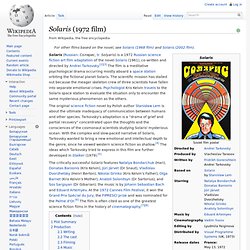
Kelvin is about to embark on an interstellar journey to a space station orbiting the remote oceanic planet Solaris. After decades of study, the scientific mission at the space station has barely progressed and the original crew have been reduced to three members, Dr. Gibarian (Sos Sargsyan), a friend of Kelvin, Dr. Solaris 1972. Andrei Rublev (film) Andrei Rublev (Russian: Андрей Рублёв, Andrey Rublyov), also known as The Passion According to Andrei (Russian: Страсти по Андрею), is a 1966 Russian film directed by Andrei Tarkovsky from a screenplay written by him and Andrei Konchalovsky.
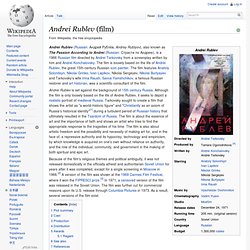
The film is loosely based on the life of Andrei Rublev, the great 15th-century Russian icon painter. Andrei Tarkovsky. Tarkovsky on art. Tarkovsky's "Sacrifice": End Credits Music. Nostalghia (1983. The Way We Are/Were: Andrei Tarkovsky’s Nostalghia. By Keith Uhlich A man adrift in a film adrift: A spectral fog hovers over the Tuscan countryside as the Russian writer Andrei Gorchakov (Oleg Yankovsky), along with his translator Eugenia (Domiziana Giordano, a pre-Raphaelite beauty in modern dress), arrives at an isolated abbey.
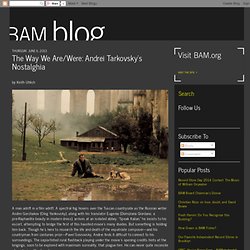
“Speak Italian,” he insists to his escort, attempting to bridge the first of this haunted movie’s many divides. But something is holding him back. Though he’s here to research the life and death of the expatriate composer—and his countryman from centuries prior—Pavel Sosnovsky, Andrei finds it difficult to connect to his surroundings. The sepia-tinted rural flashback playing under the movie’s opening credits hints at the longings, soon to be explored with maximum surreality, that plague him. Andrei Tarkovsky’s Very First Films: Three Student Films, 1956-1960. The great Russian filmmaker Andrei Tarkovsky made only seven feature films in his short life.
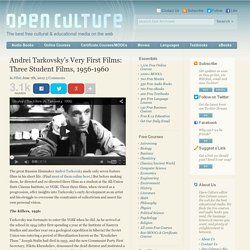
(Find most of them online here.) But before making those, he directed and co-directed three films as a student at the All-Union State Cinema Institute, or VGIK. Those three films, when viewed as a progression, offer insights into Tarkovsky’s early development as an artist and his struggle to overcome the constraints of collectivism and assert his own personal vision. TARKOVSKI. On The Bank by Arseny Tarkovsky. 21 Inspiring Quotes from Andrei Tarkovsky on Art & Filmmaking. Immos - Моя работа на съёмках "Сталкера" После окончания военной службы я решил не возвращаться в Центрнаучфильм, где работал раньше, а устроиться на Мосфильм, потому, что мне хотелось поработать в большом кино, так как я ещё не оставил надежду поступить на кинооператорский факультет ВГИКа.
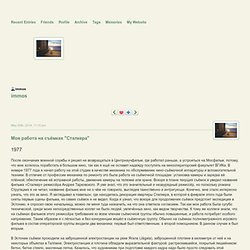
В январе 1977 года я начал работу на этой студии в качестве механика по обслуживанию кино-съёмочной аппаратуры и вспомогательной техники. В отличие от профессии механика по ремонту это была работа на съёмочной площадке: установка камеры и зарядка её плёнкой, обеспечение её исправной работы, движение камеры на тележке или кране. Вскоре в плане текущих съёмок я увидел название фильма «Сталкер» режиссёра Андрея Тарковского.
L'enfance d'Ivan, Tarkovski. Version : Zone 2Format vidéo : 4/3 format respecté 1.33Format audio : MonoSous-titres : français Bonus : Documentaire « Les enfants de la guerre » (19 mn) Entretiens avec Evguéni Jarilov, comédien (19 mn), Viatcheslav Outchinniko, compositeur (34 mn), Vladimir Ioussov, directeur de la photo (34 mn) Galerie photos Filmographies du réalisateur, du scénariste, du compositeur, du directeur de la photo, des comédiens Imprimer Nous sommes en 1941, l’Allemagne d’Hitler a donné l’assaut au géant soviétique.
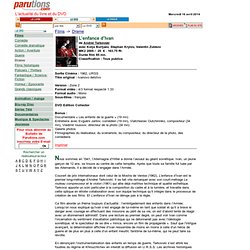
Ivan, un jeune garçon de 12 ans, se trouve au centre de cette tempête. Après que toute sa famille fut tuée par les Allemands, il a décidé de s’engager dans l’Armée. Solaris - Soderbergh. Commentaires audio de James Cameron avec le réalisateur Bande-annonce Solaris : la face cachée de Solaris Le script intégral en galeries de photos Menus animés Version : DVD Zone 2/PALFormat vidéo : 2.35Format image : 16/9 compatible 4/3Format audio : Français, anglais, italien (Dolby Digital 5.1), anglais (Dolby Digital 5.1)Sous-titres : Français, Anglais, Italien, NéerlandaisImprimer Steven Soderbergh est un cinéaste à part dans le paysage cinématographique américain.
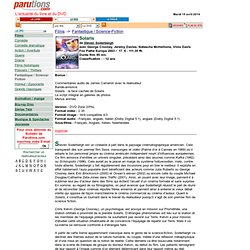
Cela transparaît dès son premier film Sexe, mensonges et vidéo (Palme d’or à Cannes en 1989) où il adopte le ton personnel propre au cinéma américain indépendant nourri d’influences européennes. Ce film annonce d’emblée un univers singulier, précédant ainsi des œuvres comme Kafka (1992) ou Schizopolis (1996). Cela aurait pu le placer en marge du système hollywoodien, mais, contre toute attente, Soderbergh y fait régulièrement des incursions pour en tirer le meilleur.
Andrei Tarkovski ou le son de la terre - Création Radiophonique. Par Charles H. de Brantes et Gilles Mardirossian (Rediffusion du 22/12/2002) Réalisation Gilles Mardirossian « Donner à entendre aux auditeurs l'univers créé par l'un des plus grands cinéastes du XXème siècle.
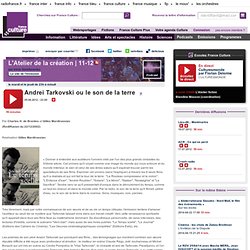
Cet univers qu'il voyait comme une image du monde qui nous entoure et du monde intérieur, le sien et celui de ses âmes sœurs qu'il espérait trouver parmi les spectateurs de ses films. Sacrificio (Andrei Tarkovsky, 1986) Alim Havel escribió:[center] IMDb. Le Sacrifice 1 - une vidéo Musique. Tarkovsky Films Now Free Online. Andrei Tarkovsky (1932-1986) firmly positioned himself as the finest Soviet director of the post-War period.
But his influence extended well beyond the Soviet Union. The Cahiers du cinéma consistently ranked his films on their top ten annual lists. Ingmar Bergman went so far as to say, "Tarkovsky for me is the greatest [director], the one who invented a new language, true to the nature of film, as it captures life as a reflection, life as a dream. " And Akira Kurosawa acknowledged his influence too, adding, "I love all of Tarkovsky's films. I love his personality and all his works.
Shot between 1962 and 1986, Tarkovsky's seven feature films often grapple with metaphysical and spiritual themes, using a distinctive cinematic style. You can now watch Tarkovsky's films online – for free. NOTE: If you access the films via YouTube, be sure to click "CC" at the bottom of the videos to access the subtitles. Would you like to support the mission of Open Culture? Andrei Tarkovsky – Zerkalo / Mirror / Le miroir (1975) Andrei Tarkovsky – Zerkalo / Mirror / The Mirror / Le miroir (1975)High quality rip from the Lizard edition (DVD9) with optional subtitles embedded.
DVDrip | Russian | Dual audio | Subtitles (optional): English, Français, Español, Português, Deutsch 1:41:54 | MKV | H264 | 720x576 | 25fps | 2.67 GB | Log | 200MB RARs | RS Audio track 1: Russian original mono track (AAC 160kbps) Audio track 2: Russian stereo 2.0 mixdown (AAC 160kbps) Genre: Art House | Biography | Classics | History "Now I can speak ! " Mirror is Tarkovsky's fourth of seven feature films and proceeds in a non-narrative, stream-of-consciousness form. The director mixes flashbacks, historical footage and original poetry to illustrate the reminiscences of a dying man about his childhood during World War II, adolescence, and a painful divorce in his family.
The story interweaves reflections about Russian history and society. Note: different rips of Mirror are available on avaxhome, but none of that quality. No pass. Philosopher avec Stanley Kubrick (3/4) : 2001 : l’odyssée de l’espace - Idées. Par Adèle Van Reeth Réalisation : Mydia Portis-Guérin Carole Desbarats G. Méric © Radio France Stanley Kubrick, troisième étape: 2001, l'Odyssée de l'espace. Tarkovsky's Polaroids / Las Polaroid de Tarkovsky. «En 1977, durante la ceremonia de mi boda en Moscú apareció Tarkovsky con una cámara Polaroid. Había descubierto recientemente este aparato y estuvo usándolo con regocijo entre nosotros.
Él y Antonioni fueron mis testigos de boda. Nostalgia (Andrei Tarkovsky 1983) Esta película nos enfrenta al deseo de querer congelar en nuestra memoria los momentos que le arrebatamos al olvido para vivir permanentemente en ellos. En esta cinta no nos vemos proyectando a la realidad nuestros deseos, como uno espera a veces ver en el cine. Se pueden ver lo que desean los protagonistas pero la mayor parte del tiempo renuncian ellos o no tienen la fuerza de voluntad para concretarlos por el peso de lo vivido.
Le miroir 1 - une vidéo Musique. Tarkovsky on art. Stalker 1 - une vidéo Musique. Andreï Tarkovski. Un article de Wikipédia, l'encyclopédie libre. Stalker,Andreï Tarkovski,1979. Tarkovsky. L' enfance d' Ivan 1 - une vidéo Musique. Solaris,Andreï Tarkovski,1972. Nostalghia (Andrei Tarkovsky 1983) Solaris (1972. Mirrors: Tarkovsky & Derrida in Historical Ruins. Mirrors: Tarkovsky and Derrida in Historical Ruins The literal definition of history is as, ‘an aggregate of past events and human affairs’ and ‘the events forming the subject matter of a historical account’.
Consequently, if a photographic image is verifiably a ‘certificate of presence’ or ‘that-has-been’ as Roland Barthes avows in Camera Lucida, then is all photography, and by logical extension the motion of enjoined photographic images that is cinema, not history in its purest forms? Lynne Hunt’s essay ‘History as Gesture’ supplies the central dialectic of my enquiry – one that understands these central definitions of history, and extends into a discourse on historical representation: ‘History is a search for truth that always eludes the historian but also informs (her) work, but this truth is not an objective one in the sense of a truth standing outside the practices and concerns of the historian’.
Like this: Like Loading... Stalker, d’Andrei Tarkovski - Alissa Feindikh, Alexandre Kaidanovski. SYNOPSIS : Stalker, sorte de guide, accompagne un physicien et un écrivain dans la "zone", vaste no man's land ou jadis est tombe une météorite. Ce territoire contient un secret: "la chambre des désirs" exauçant les voeux de ceux qui s'y rendent. Autour du cinéaste Tarkovski se crée un halo mystique déstabilisant le spectateur occidental qui s'attend au message humaniste et religieux. En réalité, il se trouve sans défense devant cette orchestration bizarre de rythmes lents, de visions proches de l'hallucination et de sensations humides.
Sans soleil. Un article de Wikipédia, l'encyclopédie libre. Sans soleil est un film documentaire français réalisé par Chris Marker sorti en 1983, visant à mettre en relation diverses cultures comme la civilisation japonaise et la Guinée-Bissau ou encore le Cap-Vert. Stalker (film)